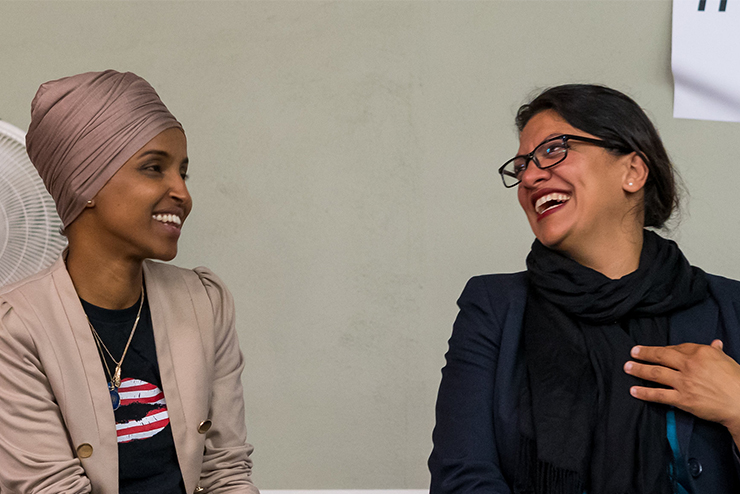The Democratic leadership and its “woke” leftist allies have been held together thus far by their hatred of both the right and of normal people. But the glue that binds that coalition is starting to dissolve, Chronicles editor-in-chief Paul Gottfried argues in a recent article for American Greatness. He suggests that the conflicting interests and loyalties of the intersectional left, with its militant gays, transgender activists, black nationalists, and Muslim fundamentalists, as well as the present strife between pro-Israel leftist Jews and pro-Palestinian activists, may be a portent of a larger breakup on the left.
I wish I were as optimistic as Gottfried.
Democratic “moderates” such as Joe Biden, Nancy Pelosi, and Chuck Schumer may indeed be fated to fall apart with the rabid intersectional activists, but I worry that the country will suffer irreparable harm long before it does. I fear that the Democratic alliance is held together by potent psychological factors that keep it together long enough to do damage to the country.
I’m the first to admit that the fissures within the grand alliance uniting the many factions within the current Democratic Party run far and deep. To imagine that a devout Muslim like Rep. Ilhan Omar, D-Minn., really supports transgender rights for men to share locker rooms with women, or that upwardly mobile Asian Americans are fond of racial quotas favoring African Americans, is to live in a fantasy world.
Now that Latino Americans make up almost 50 percent of the Los Angeles police force, I’m guessing they’re not crazy about Black Lives Matters activists who call for defunding the police.
Nor are pro-Israeli Democrats like Debbie Wasserman Schultz thrilled when Representative Rashida Tlaib, D-Mich., lectures Joe Biden in full view of the TV cameras that Israel is to blame for the recent violence between Jews and Palestinians.
But to think that these differences are major obstacles to unity ignores two important facts. The first is the nature of cognitive dissonance, the mental ability to hold as true inconsistent thoughts, beliefs, or attitudes at the same time. Psychologists emphasize that cognitive dissonance can become discomforting, but studies also show that as long as the contradictions do not deeply affect a person’s daily comfort level, they can persist for long periods of time.
A case in point might be a Democratic voter who backs both the legalization of people killing themselves with medical assistance and government funding of programs designed to prevent suicide. I’ve yet to meet anyone whose social functioning is impaired by holding these beliefs.
The second factor is the pervasive therapeutic mentality in America. American society is dominated by a huge “caring industry,” physician and political scientist Ronald W. Dworkin argued recently in National Affairs. This translates widespread unhappiness into what he calls “a revolutionary ideology,” replacing traditional culture with a worldview mobilizing the masses for “active participation in the building of the new political order.” This “caring industry” consists of roughly 1.2 million clinical psychologists, social workers, nurse psycho-therapists, and other counselors who preach that emotional well-being is the highest goal in life, that thoughts, feelings, and behaviors are real and not imagined. The mentality that individuals are never to blame for their unhappiness and misfortune teaches a value system built on the core belief that countless Americans are vulnerable and victimized at the hands of enormous forces threatening to overwhelm their daily lives.
To Dworkin, the “caring industry” and its “consciousness-raising purposes” show up in numerous colleges and offices in the form of diversity seminars and struggle sessions intended to advance identity politics. It also seeps into politics in a highly partisan fashion, as evidenced by invitations from the Democratic party to Oprah Winfrey to run as its presidential candidate in 2020. Winfrey’s TV show in the 1980s and 1990s did as much as anything to promote the therapeutic gospel.
The therapeutic sensibility was also on full display in D.C. on Feb. 4, 2021. Rep. Alexandria Ocasio-Cortez, D-NY, organized a special hour of speeches by Democratic lawmakers who re-lived the “trauma” they experienced when mobs swarmed Capitol Hill on Jan. 6. AOC claimed that the fear and horror she felt that day rekindled memories of past sexual assault, although she hadn’t actually been in the Capitol building on the day of the protests. Tlaib was also absent from the Capitol building that day, but in her mind she might as well have been. Comforted by AOC, she declared: “this is so personal, this is so hard.”
The combination of cognitive dissonance and the therapeutic mentality bolsters what may appear to be a fragile unity within the ranks of the Democratic Party. When added to the propagandizing of the mainstream media, which determinedly avoid topics such as Biden’s mental faculties or the death of Ashli Babbitt on Jan. 6, the likelihood of the Democratic leftist coalition burning out any time soon appears remote.
Of course, predictions are a mug’s game. For example, almost no one in high places predicted that the Soviet Union and its empire in eastern Europe would fall with stunning rapidity back in the late 1980s. But fall it did, and a key reason was the ultimate refusal of countless Soviet citizens to believe their government’s propaganda.
Unforeseen circumstances such as the passing of Donald Trump could also prove to be game-changers. But Trumpism will live on, so Democrats of all stripes will probably overlook their differences in the face of what they imagine is a hated common enemy.
My advice to the millions who voted for Donald Trump in 2020 is batten down the hatches. The antics of Democratic government will likely get worse before they get better.
Image Credit:
Flickr-brads651, CC BY-NC-SA 2.0

Leave a Reply